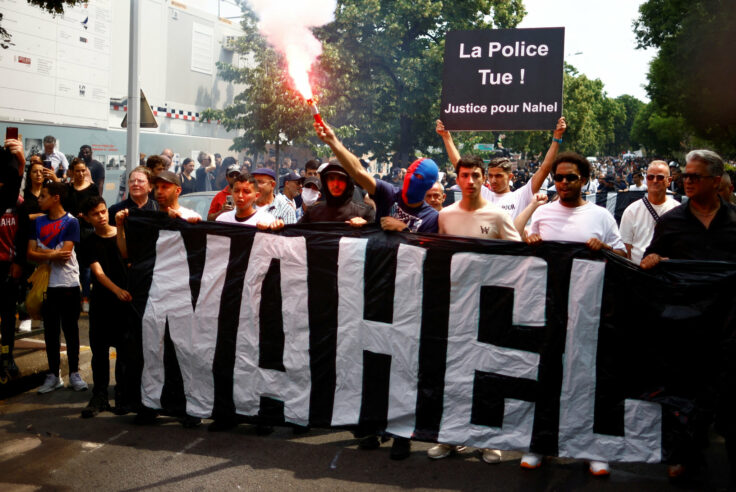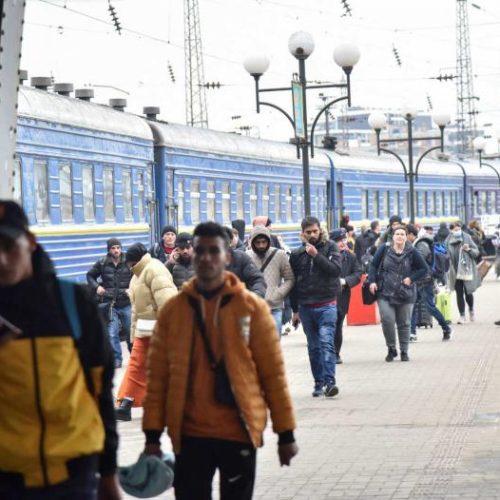Anyone who hoped that for a second France’s political climate would improve with the advent of summer will be deeply disappointed to learn that it hasn’t— in fact, it only got worse. Those who thought that France learned from its past mistakes and crimes were proven, once again, wrong last week following the fatal shooting of 17-year-old Nahel Merzouk by police forces on June 27.
Police officers approached the teenager during a drive around his neighborhood with friends, reportedly asking him to provide identification of himself as well as the registration of the yellow Mercedes he was steering. The situation quickly escalated as CCTV footage captured the two officers rapidly pointing their firearms at the group of young boys, before shooting at point-blank range and killing Merzouk on the spot.
According to an official statement issued by authorities, Merzouk allegedly failed to comply with the officers’ demands. The officers claimed that they consequently felt as if they were in grave danger, despite first-hand eyewitnesses and videotaped evidence explicitly showing the situation to have been otherwise. Based on the footage, the police threatened the 17-year-old with “a bullet to the head,” before cutting his life short. Merzouk’s death has sparked nationwide outrage, protests, and calls for a thorough investigation into the incident to be led with relevant sanctioning imposed on the responsible officers in order to ensure justice is, for once, served.
Far from being France’s first time making headlines for its brutal, and lethal, use of police force, this latest case of murder perpetrated by the State’s very own vigilante eye and weaponized arm only happens to bring its colonial past and bloody legacy into sharp focus once again, igniting a renewed national dialogue on systemic racism, historical injustices, and the urgent need for deep and thorough change on all levels of society.
With the blood of France’s penultimate tragedy barely even dry— which came less than two weeks before Merzouk’s, where 19-year-old Lucen Camara suffered from the exact same fate as the 17-year-old French-Algerian under similar circumstances — an oft-dismissed chapter of the country’s past, present (and by the looks of it, even future) has been re-opened, coming back to the surface to haunt an entire segment of society that is tired of living in fear and mourning the loss of their loved ones at the hands of those sworn to protect them.
Singular mishaps have turned into monthly disasters, with testimonies from friends and families of victims repeatedly painting harrowing pictures of a system that perpetuates injustice and protects those responsible for these senseless acts of violence. And as it turns out, with no real surprise, Merzouk’s story is, unfortunately, following in the same direction as the hundreds of others, who like him, died at the hands of a corrupt and deeply fractured institution upheld by bandits in blue-coated uniforms and their right-wing supporters.
To make matters worse, a crowdfunding campaign was launched l in support of the officer who has since been suspended for shooting Merzouk, aiming to help him cover the legal fees he will incur and to compensate for any emotional distress caused as well. Created and fuelled by France’s far-right wing, the total amount gathered reached past the 1.5M Euro benchmark in less than two weeks, signaling a deeply concerning level of support for the officer involved in the teenager’s murder, while highlighting the large-scale influence of extremist ideologies which simultaneously prove that what we thought was a small silent minority might be on its way to becoming a large and loud majority.
Following the Algerian teen’s death, two parallel conversations are being had across the French State, both intrinsically linked and taking place in real life, online, and in any public and private sphere one can think of, as the two wrestle for dominance despite carrying equal levels of importance. The most pressing one, which probably requires the least amount of intellectual effort as it should be fuelled almost solely by human emotion and empathy, is: how do we put an end to people needlessly losing their lives at the hands of those that are supposed to care and guard them from harm?— a vital question that adamantly requires a comprehensive reevaluation of law enforcement practices and policies.
The second, which is probably the most important today, is how do we hold an almost entire system accountable for the persistent failures and injustices that have led to these tragic outcomes? Especially in cases where the public’s opinion is so divided and polarised. In Merzouk’s case, the officer responsible for his murder is in custody, still pending trial, and charged with intentional homicide, although there’s not much hope for a fair nor relevant condemnation to be served given the pattern of lenient sentences usually pronounced to policemen in the past.
For as long as we can remember, living in France as a POC has always been a complex and challenging experience, fraught with systemic discrimination, prejudice, and micro-aggressions. While we are constantly reminded of the ideals of liberty, equality, and fraternity that are fundamental to the French Republic, the lived reality for many reflects a stark opposite scenario, where social exclusion, racial inequalities, and tragic loss of lives punctuate the everyday lives of millions in the country. While a status quo is yet to have been found, one can only wonder how much further the situation can escalate before urgent and substantial changes are made to address these deep-rooted issues and finally provide dignity and safety to all.






